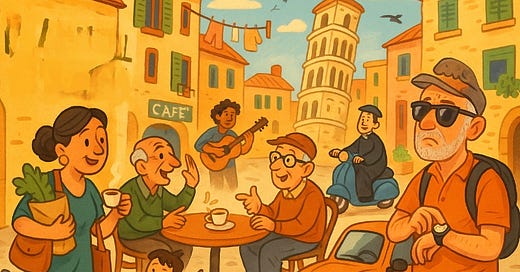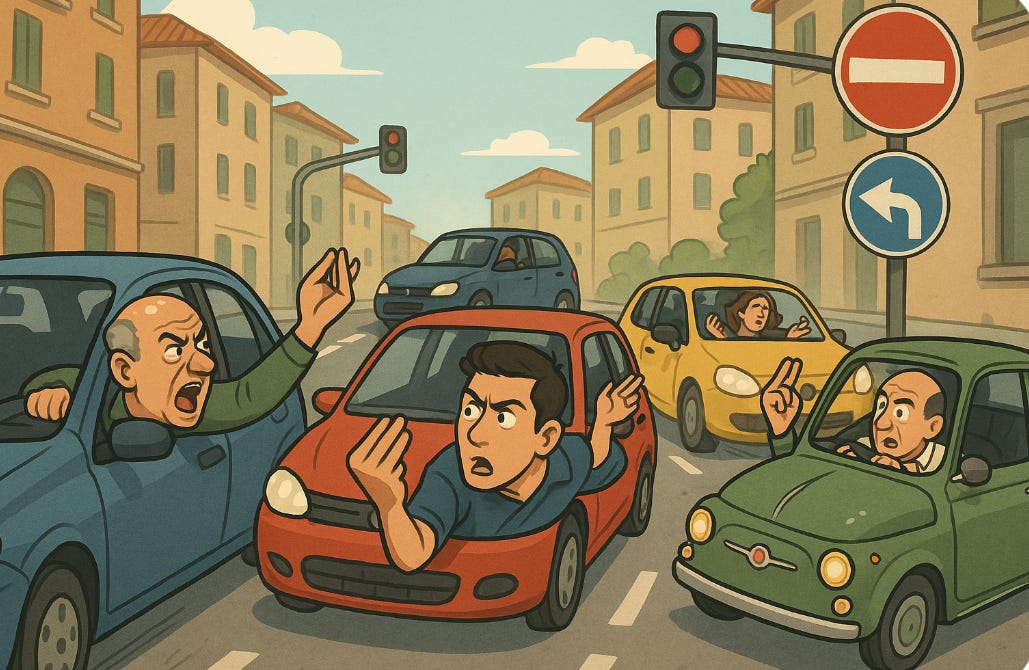Beautiful Chaos
One of the first words you need to learn in Italy is domani. It means “tomorrow,” but really, it means: Not today.
It’s late Sunday night as I sit down to write this newsletter. My window, which opens onto Piazza Sant’Agostino, is wide open. From outside, the sounds pour in: children still playing, adults chatting, a ball bouncing rhythmically off the wall, a Vespa engine growling against the old brick buildings.
So, I close the window, trying to concentrate. trying to find that calm space where thoughts fall into sentences.
And then I realize what I’ve done. I’ve shut out the very thing I came here to write about:
The beautiful chaos.
The living, breathing pulse of Italy.
The Italianismo.
Italianismo (ee-tah-lee-ah-NEES-moh): the distinctive cultural essence and way of life that embodies being Italian—a collection of attitudes, values, and behaviors that make Italian culture uniquely recognizable around the world.
I consider it a privilege to speak Italian fluently and to carry within me the roots of an Italian heritage. But having spent much of my life away, I now straddle two worlds. I recognize the gestures, the humor, the rhythms of daily life—they’re deeply familiar, almost instinctive. And yet, after so much time abroad, I sometimes feel slightly out of step—like when I’m genuinely hungry at 6:30 p.m. but have to wait until 9:00 to eat with friends.
So, come along for a little joyride through the Italian way of life—as seen by someone who belongs, but not entirely; who remembers, but is still rediscovering.
Time Is A Suggestion.
If you want to survive here, you’ll need to let go of urgency and embrace uncertainty.
Make no mistake, it’s not about inefficiency; rather, it’s a different value system, where time is elastic, human connection comes before convenience, and beauty matters more than speed.
One of the first words you need to learn in Italy is domani. It means “tomorrow,” but really, it means: Not today. Maybe tomorrow. Maybe not.
It’s not meant to deceive—it’s just that the future is not something to rush into. Why hurry? Domani always sounds full of promise, even if that promise is eternally postponed.
And then there’s vediamo, “we’ll see.” This one’s more slippery. It’s a yes, a no, a maybe, a not-a-chance, and a let’s-not-talk-about-this-right-now— all rolled into one. To a North American ear, it's maddening. But to an Italian, it’s a masterpiece of flexibility. Why tie ourselves down? Who knows how we’ll feel tomorrow?
Ci vediamo dopo. A dopo. See you later. But when? Could be in ten minutes. Could be next week. The beauty of the phrase is its open-endedness. It’s not meant to lock you in—it’s meant to leave the door open. A shared understanding that connection matters more than the clock.
Stay Calm And Carry On.
This one used to drive me nuts. It seemed the more I pushed back, the more I heard tranquillo. It means “calm,” but ironically, it often had the opposite effect on me.
You're late? Tranquillo. Lost your keys? Tranquillo. Someone’s yelling at you in traffic? Tranquillo.
Whenever I try to challenge the system, to tighten the screws or fix what’s broken, I’m met with a gentle Va bene così—“It’s fine like this.” It’s a go-go statement for Italians when they want to express a quiet refusal to overcorrect or overcomplicate.
Like the time I brought my car to the garage for an AC issue. The mechanic looked at the car and said, “I don’t see the problem—it’s not that hot out. Tranquillo.”
Even when things clearly aren’t quite right, you’ll hear “Tutto a posto.” Everything’s in place.
So the train is late, the plumber didn’t show, and the paperwork is missing a stamp? Tutto a posto. The phrase isn’t about accuracy; it’s about not letting life’s little frictions ruin the day.
When my inner Canadian wants to sort things out and fix all the broken pieces, someone will inevitably say, “Non ti preoccupare.” Don’t worry. Not because there’s nothing to worry about, but because worry isn’t always worth the energy.
And when all else fails—when the power’s out, the post office closed early, and the paperwork you need is in an entirely different office—you’ll hear the ultimate shrug:
È l’Italia! It’s Italy!
Long lunches, longer conversations.
Meals are a social event. You don’t “grab a bite”—you sit, talk, digest, order coffee, talk more. Waiters won’t rush you, and the check won’t come until you ask for it (often twice).
Driving? Buckle Up.
Getting a driver’s license in Italy means studying from a pool of over 8,000 questions. I’m not exaggerating—that’s the real number. One rule might appear in twenty different variations just to make sure it really sinks in.
And then what happens?
You pass the test… and immediately drive like a complete maniac. You’ll be tailgating like it’s a national sport, passing on blind curves, treating red lights like polite suggestions. It’s as if the written exam was just hazing—and once you survive it, you’re free to unleash your inner stunt driver.
Opinions Are Public Property.
Italians like to throw in their two cents on anything from your parenting style, the length of your pants, your lunch choice, to your love life.
Their comments will usually be motivated by concern, however they’re often laced with judgment.
“Why don’t you wear a scarf; c’è il vento!” (It’s windy!)
Although said with care, it can feel somewhat intrusive.
Or how about this scenario? “Ah bello! I see Italian life has been good to you; you’ve put on a few pounds!” (Why I outta!…)
Once, in Bergamo, we found a charming restaurant, around 2:30 p.m., for a late lunch. When the waiter came to serve us, the first thing he said was:
Ma è un’ora questa per venire a pranzo?
“Is this what you call lunchtime?”
I wasn’t sure if he was joking or judging. Probably both.
Legally Flexible.
"La Legge è Uguale Per Tutti"—The Law is Equal for All, a direct quote from Article 3 of the Constitution, it’s inscribed above the judge’s bench in every courtroom in Italy.
And yet, from traffic violations to building permits, reality often tells a different story. Let’s just say that connections (and charm) can go a long way in getting one out of a mess.
Trash Sorting (Complicated Or Genius?)
You’ll need five different bins before you bring your trash to designated locations where there are containers for every existing material. To open them, you need a personalized Trash Card—valid only in your neighborhood.
There’s nothing like standing in the rain, waving your Trash Card at a locked bin, as if you’re trying to access a secret club for banana peels.
The Flipside Of The Coin.
And yet—as much as Italian’s seemingly cavalier attitude can be frustrating, aggravating, even infuriating—there are moments that erase all the annoyances and make you fall madly in love with Italy all over again.
Take for instance the bus driver in Siena, who went out of his way to drop me at the rental car agency before it closed.
Or consider the waiter in Lucca who pulled a table from the basement to make room for two more in a packed restaurant.
Then there’s the mechanic who stopped working on a big job to fix my broken beam before I left for a road trip. (Yes, the same one who dismissed my AC issue!)
And what about my Airbnb owner in Montefiascone who did my entire laundry when the local laundromat was unexpectedly closed?
Yes, living in Italy means surrendering to imperfection, flexibility, and personally-driven systems. For some, it’s charming. For others, it’s maddening. But for all, it’s unmistakably Italian.
I call it: Beautiful Chaos.








Grazie Donatella
A few years ago Liz and I spent a week in Villa Minozzo for a painting class in watercolours. There were a few people at this class and two of them were an English couple. The fellow, whose name I no longer remember, broke the strap on one of his sandals and could no longer wear them. We asked Fiona, our host, where we could get it fixed and she gave us some direction to another small town nearby. We found the building and when we entered, found a coffee shop on the main floor and asked for the shoe repair. We were told it was in the lower level and proceeded to go find the shop. An elderly gentleman was working in it and he told my friend that he could fix it. We went back upstairs and had a coffee while we waited. In a short while the gentleman came back up with the repaired sandal. When I asked him how much for the repair he looked at us and said “Eh! Un caffe”. Ah! Italians😊.